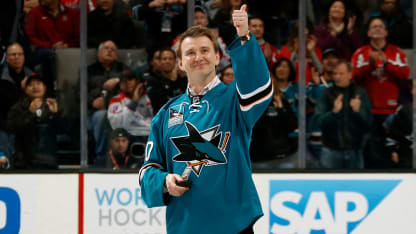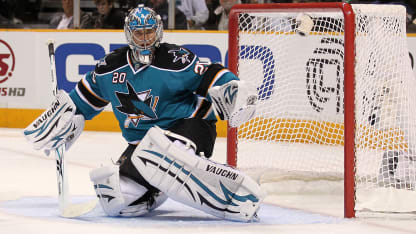NHL.com's Q&A feature called "Five Questions With …" runs every Tuesday. We talk to key figures in the game and ask them questions to gain insight into their careers and the latest news.
The latest edition features former San Jose Sharks goalie Evgeni Nabokov, who is now their goaltending coach.
Five Questions with Evgeni Nabokov
Sharks goaltending coach discusses Dubnyk's attributes, size at position, Russian influence

Evgeni Nabokov is growing into his role in his first full season as goaltending coach for the San Jose Sharks.
"I wasn't sure how much I was going to like it," Nabokov said. "I always loved talking about hockey, but having a certain relationship with the guys, it's really different because now you have to be sometimes telling them what they need to do or telling them how you see the game. You don't know how that would go, but it's turned out that I like it. It comes naturally, I guess."
Nabokov, the Sharks' all-time leader in games played by a goalie (563), wins (293) and shutouts (50), was originally brought back into the organization by general manager Doug Wilson as a goaltending development coach and scout five years ago.
It made for an easy transition to the next phase of his hockey career after announcing his retirement on Feb. 11, 2015, ending a 14-year NHL career, including 10 seasons with San Jose.
But the Sharks needed more from Nabokov when they made a coaching change last season that included firing goalie coach Johan Hedberg on Dec. 11, 2019. That's when Nabokov assumed his current role, an instrumental assignment for a team that needed better goaltending.
Martin Jones and Aaron Dell, San Jose's goalies last season, improved under Nabokov, combining for a .910 save percentage in the final 37 games after combining for a .891 save percentage in San Jose's first 33 games last season.
Nabokov is now in charge of working with Jones and Devan Dubynk, acquired by the Sharks in a trade with the Minnesota Wild on Oct. 5. San Jose is hopeful its goaltending can be good enough to get back into the Stanley Cup Playoffs after it failed to qualify last season.
"You can't go anywhere without it," Nabokov said.
Here are Five Questions with ... Evgeni Nabokov:
What do you see in Devan Dubnyk that you like and what do you feel you can do to help him, because last year was a struggle for him both on and off the ice?
"He's a proven guy. In his past, before last year, he played about 65 games every year and he was a three-time all-star. He played a ton and he played really well. He's obviously a big boy (6-foot-6, 224 pounds) who has a really good foundation. I always liked his character. I knew him a little bit before. I criss-crossed with him a couple times and talked to him. I know how competitive he is. And knowing the story of his off-ice, if anybody would have his off-ice story, I don't care who you are, but you will struggle. You will go through some tough times because his mind wasn't really in hockey. His mind was with his family (he missed time in November and December when his wife, Jenn, was dealing with a medical situation). I looked at it and I said, 'As long as he is healthy he can help us with his experience,' and he does have experience. Through his hockey career he's been through everything. He went through huge downs, almost out of the League to becoming an All-Star goalie. He's not a stranger to rocky starts, rocky moments, so that means to me that he is battle tested. We were looking for a No. 2 guy and I thought he would be a good choice on so many different levels. We knew that this season is going to be so tight, very unusual, and we wanted the guy who had experience. Him being 6-foot-6, very similar to Jones, who is 6-4, I think it was kind of an easy decision once we went into the details and we found out why he had a bad season last year."
It's interesting you mention his height. Goalies are bigger now, just generally taller and bigger than when you were playing. You're 6-foot, 6-foot-1 on skates. Dubnyk is at least 6-foot-8 on his skates. Why do you think that trend has taken hold, where it's bigger guys playing the position?
"To be honest with you, I don't know, I don't have an answer for that. But my guess is that before if you were small and maybe not a good skater they would say, 'Go be a goalie.' But it's always been really far from the truth that you can do that and be a good goalie. But like everything in hockey, if someone has success and kids were watching they might say, 'This is something I want to do.' I don't have a definite answer for why there are so many big guys, but especially now you're seeing all these big guys with athletic ability. You look at
[Andrei] Vasilevskiy
(6-3, 215), very athletic, there's nothing he can't do. Before the big guys who were goalies it was like, 'Yeah, they're big, but they can't move very well.' Now they can."
The other trend that hits home with you is we're seeing an influx of Russia-born goalies in the NHL. What has happened in the development of goalies in Russia to enable this?
"In Russia, it's never been really goalie-driven. When I was growing up, very few times did we have goalie camps all over the country. Usually it would be in certain areas. For example, where I grew up in Kazakhstan, my dad would coach all the youth goalies, but you didn't have that nationally, just everywhere. Now it's everywhere. Plus you have all the Finnish guys kind of joining the group and helping out there. You probably have some Czech guys there, Swedish guys too. So it's all over the place there now and it's giving the kids a better foundation early. That's what helps, where before you may hit and miss in certain areas in Russia. Originally, we always had good goalies, there just weren't as many of them and some of them just didn't come over here to North America. That's another thing. Now it's more open than it was even 15 years ago. Those guys are traveling and some of them are training through the Red Bull program in Austria and being trained by Finnish and Swedish guys too. So, you pay for it and you go, but when I grew up we were never able to do that. The world has opened up. Russia has opened up. That all helps the young guys, because now you have options."

Another development in goaltending is you're seeing teams announcing the formation of goalie departments. The Calgary Flames and Florida Panthers are the latest. Is this a trend now? Do you think more are coming?
"We already have all this too [in San Jose] with three of us (Nabokov, goalie consultant Adam Francilia, San Jose AHL goalie consultant Dany Sabourin), we just don't have a fancy name for it. I think you have to have it this way. You remember back in the day in the minors you'd have this goalie coach who is only there 10 times a month and then if your No. 1 goalie goes down you kind of got stuck. It used to be Martin Brodeur playing 65 or 70 games. Now you hear stats saying 65 is too many, 50 is better. So people are trying to catch up and make sure they are developing the young kid who you don't have to rely on yet. Vasilevskiy isn't going to come into your organization every time. There's only a few of those guys. But you can always have somebody there all the time and give enough time to your guys not only on the ice, but maybe off the ice too. People are getting really creative now off-ice with all the visual stuff.
"It's like we used to have two or three coaches on the bench, and now you have sometimes four on the bench. It's the same thing here with goaltending. If your one guy doesn't see something, now you have two other guys watching the game and saying what they see. It's a little bit of a trend going on and like anything, there's life for it as long as the brains know what they're doing and they're all on the same page. I like it. Everybody has always talked about how important goalies are, but there are times when you say, 'We need to do the goalie drills,' and the response is, 'Screw the goalies.' Slowly we're getting away from that."
How has coaching the position evolved from when you played?
"I think it's more consistency. When I was there, when I played, you would have a goalie coach once in a while and you will have maybe 10 or 15 minutes. Now the volume is bigger. Now the guys all have an iPad and you can look between periods now at the power play or penalty kill or whatever you want. We're getting really good at preparation. Taking a look at certain things between periods can really help. I do think communication between the goalies and the goalie coaches can be better, but every individual is different. Don't forget, sometimes you might have a goalie in his early 30s and you have to be careful how you want to go after it with him. But if the goalie is younger and you know exactly what he likes and you're still building something with him you can be really creative. It's making sure the guy you have has an open mind rather than just saying, 'I'm good.' It's in the process still to see where the guys are, but what I see as the biggest difference is the consistency at coaching and working. It's better than it used to be."

















